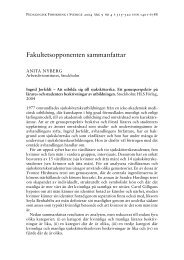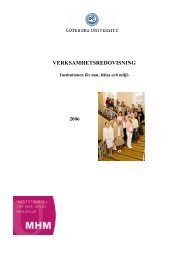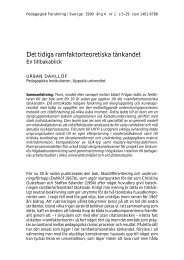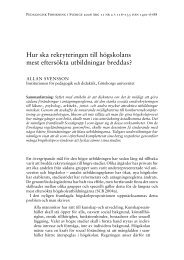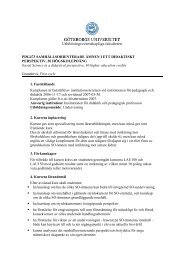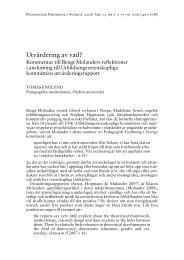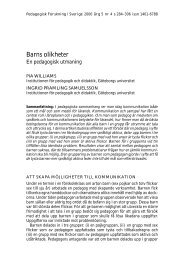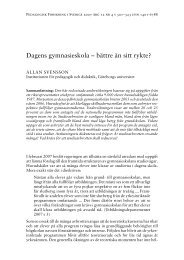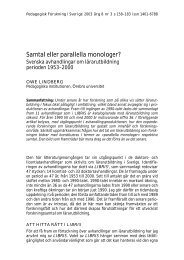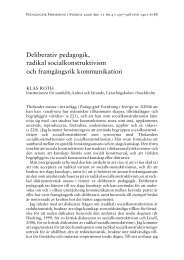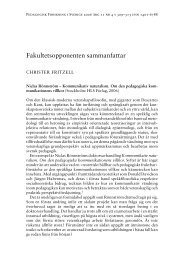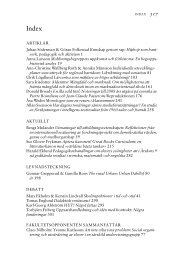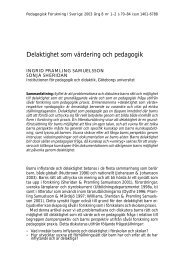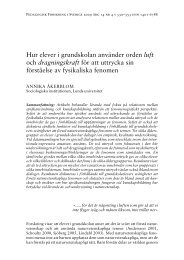University of Oslo Workshops June 29-30 Conference July 1-3 ...
University of Oslo Workshops June 29-30 Conference July 1-3 ...
University of Oslo Workshops June 29-30 Conference July 1-3 ...
You also want an ePaper? Increase the reach of your titles
YUMPU automatically turns print PDFs into web optimized ePapers that Google loves.
Sampling Design for the Teacher Education and Development Study in<br />
Mathematics (TEDS-M): Challenges, Solutions, Restrictions<br />
Sabine Meinck, IEA Data Processing and Research Center, Germany<br />
Jean Dumais, Methodology Branch, Statistics Canada, Ottawa, Canada<br />
The Teacher Education and Development Study in Mathematics (TEDS-M) focuses on<br />
how teachers are prepared to teach mathematics in primary and lower secondary schools in<br />
seventeen countries. This is the first large-scale assessment in teacher education using<br />
statistical sampling. The demanding study goals, combining four target populations into<br />
one survey on the one hand, and the complexity and differences <strong>of</strong> the teacher education<br />
systems in participating countries, on the other hand, posed particular challenges to design<br />
a multi-purpose international sampling plan. The four target populations <strong>of</strong> the TEDS-M<br />
study are teacher preparation institutions, future primary and lower secondary mathematics<br />
teachers, and their educators, for which reliable estimates <strong>of</strong> their main characteristics were<br />
required. The overall achieved participation rates in most countries complied with the<br />
demanding standards set by TEDS-M and therefore ensure a high validity <strong>of</strong> the data<br />
collected. Although high technical standards were maintained, certain restrictions must be<br />
put on data analysis and on the interpretation <strong>of</strong> the results. Data observed from<br />
populations with low participation rates will be annotated as such in the forthcoming<br />
international reports. Further, specific structural or political circumstances made it<br />
necessary for some countries to implement sampling or operational procedures that<br />
deviated from the international design. Cross-country comparisons must be made with<br />
caution; results always need to be embedded into adequate contextual explanations.<br />
Experiences gained throughout the implementation <strong>of</strong> this study can contribute valuably to<br />
the specification <strong>of</strong> sampling designs in further studies in higher education.<br />
Keywords: sampling; survey methodology; teacher education; TEDS-M 2008<br />
Expertise <strong>of</strong> Future Teachers: On the Relationship <strong>of</strong> Mathematics Content<br />
Knowledge, Mathematics Pedagogical Content Knowledge and General<br />
Pedagogical Knowledge<br />
Johannes König, <strong>University</strong> <strong>of</strong> Cologne, Germany<br />
Sigrid Blömeke, Humboldt <strong>University</strong> <strong>of</strong> Berlin, Germany<br />
<br />
Teacher expertise consists <strong>of</strong> cognitive and affective-motivational components. Based on<br />
TEDS-M data, our study examines the structure <strong>of</strong> the cognitive components <strong>of</strong> future<br />
mathematics teachers in their final year <strong>of</strong> training. According to Shulman (1986) three<br />
sub-dimensions can be distinguished. In case <strong>of</strong> mathematics teachers, these are<br />
mathematics content knowledge (MCK), mathematics pedagogical content knowledge<br />
(MPCK), and general pedagogical knowledge (GPK). However, teacher expertise requires<br />
interlinking these components in order to perform successfully in class (Berliner, 2001).<br />
We ask (1) in general and (2) for subgroups whether teacher knowledge (TK) has a<br />
homogeneous structure or should better be differentiated according to the assumed three<br />
cognitive components. The German and US TEDS-M samples are used to test these<br />
hypotheses since the two countries included an additional test instrument that allowed<br />
rigorous measurement <strong>of</strong> GPK. Given the point in time – future teachers at the end <strong>of</strong> their<br />
67



